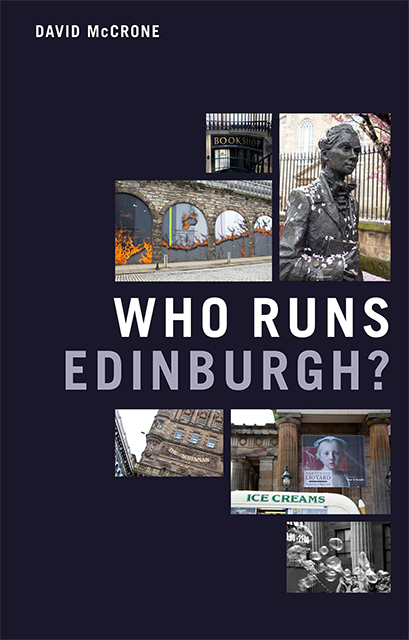Book contents
- Frontmatter
- List of Contents
- Figures and Tables
- Preface
- 1 Who Runs Edinburgh?
- 2 Politics in Edinburgh
- 3 Winners and Losers: The Political Economy of Edinburgh
- 4 Treading Angels: Edinburgh and its Festivals
- 5 Are You One of Us? Status in the City
- 6 What School did You Go To? Education and Status in Edinburgh
- 7 Enlightened City: Cultural Power and University Life
- 8 Developing Edinburgh: Pies in the Sky, Holes in the Ground
- 9 Lost in Leith: Accounting for Edinburgh’s Trams
- 10 Does Anyone Really Run Edinburgh?
- Bibliography
- Index
5 - Are You One of Us? Status in the City
Published online by Cambridge University Press: 25 October 2023
- Frontmatter
- List of Contents
- Figures and Tables
- Preface
- 1 Who Runs Edinburgh?
- 2 Politics in Edinburgh
- 3 Winners and Losers: The Political Economy of Edinburgh
- 4 Treading Angels: Edinburgh and its Festivals
- 5 Are You One of Us? Status in the City
- 6 What School did You Go To? Education and Status in Edinburgh
- 7 Enlightened City: Cultural Power and University Life
- 8 Developing Edinburgh: Pies in the Sky, Holes in the Ground
- 9 Lost in Leith: Accounting for Edinburgh’s Trams
- 10 Does Anyone Really Run Edinburgh?
- Bibliography
- Index
Summary
Consider the jokes about Edinburgh. They are about reserve, snobbery and meanness (‘East Windy, West Endy’; ‘fur coat and no knickers’; ‘You’ll have had your tea?’; ‘Queen Anne front; Mary Anne back’). Behind them one can sense a process of decision-making which implies a city in which status matters rather than simply social class. Status is about social and cultural power, rather than about money and wealth, although it would be foolish to treat these as distinct spheres. Recall the comment by John Heiton with which we began this book: ‘“Look you, sir. Your city is a very fine city, but it swarms with castes”. The American was right: Our beautiful Modern Athens is in a swarm of castes, worse than ever was old Egypt or is modern Hindostan’ (Heiton 1859: 1). Edinburgh: as a city of castes, verging on the conspiratorial.
THE SOCIAL WORLDS OF EDINBURGH
In this chapter and the next, I will consider these spheres, first, those who inhabit the shady social worlds, based indubitably on wealth, but discreetly manifest, underplayed and often unspoken. In Edinburgh, you don't flaunt it. This is the world of clubs, associations which you do not join without an invitation, and without knowing who else is a member. If you have to ask to join, then you’re not their sort of person. Fuelling this world, the story goes, is a complex hierarchy of schools, many, but not all, in the private sector. If Edinburgh is a city of castes, then the question what school did you go to? becomes the key to open doors, and we will examine that in Chapter 6. There is, however, a complex relationship between rhetoric and reality. One might believe that Edinburgh is a hierarchical and closed society –it has myth-status –but we cannot take that for granted, at least in the times we live in. Past and present are in a curious relationship: we cannot rule out that once upon a time the city's caste-like culture was more important than it is now, while accrediting the myth of caste with considerable power to define the situation as all too credible. But myths have a habit of living on and dragging out in their after-life.
The World of Clubs
First, we will explore the world of clubs and associations, by picking out a few which come up in Edinburgh conversations.
- Type
- Chapter
- Information
- Who Runs Edinburgh? , pp. 112 - 139Publisher: Edinburgh University PressPrint publication year: 2022



